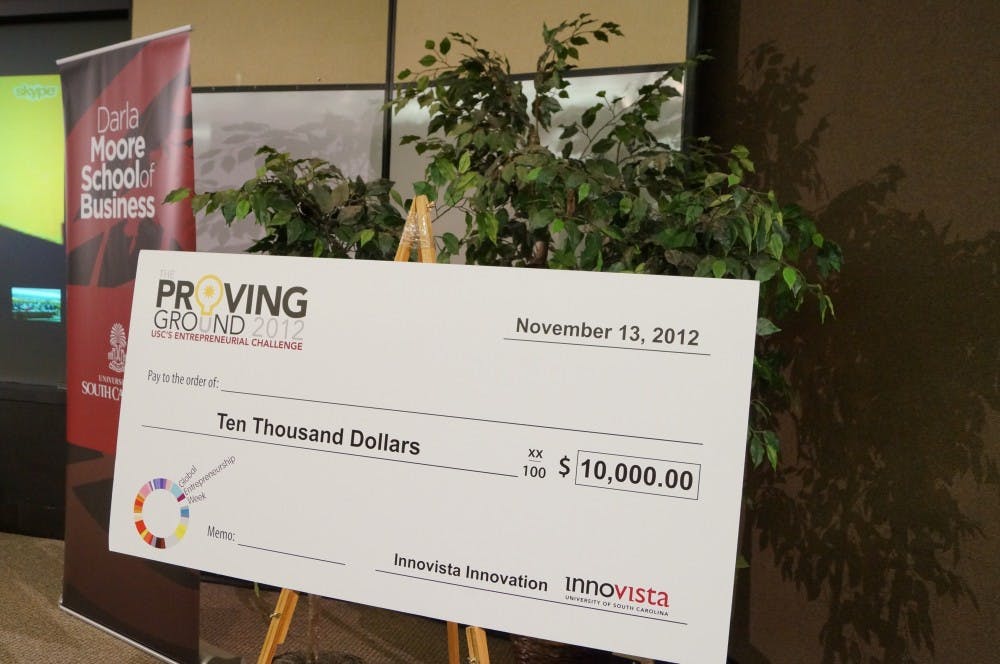Entrepreneurship competition offers cash for winning startup ideas
For Stephen Bateman and Randall Stewart, it all started with an idea for a daily email newsletter called “Good Morning, Gamecock.” Two years later, the seed of that idea has grown into something almost unrecognizable, Stewart said, thanks to the jumpstart provided by USC’s Proving Ground entrepreneurship competition.
Before Bateman and Stewart’s “Good Morning, Gamecock” newsletter became the USC sports-centered website Garnet Report, it was one of the winners of the fast-growing annual entrepreneurial challenge.
Proving Ground began in 2010 with 22 business plan submissions and $5,000 in prize money for the winners. It’s expanded each year, with 50 submissions last year. Now hosting the competition for its fourth year, sponsors from USC’s Faber Entrepreneurship Center, Office of Economic Engagement and Center for Entrepreneurial and Technological Innovation (CETi) are expecting anywhere from 75 to 100 submissions, with a total of $45,000 in prizes being split among winners in each of three categories: technology, innovation and social impact.
“I don’t think Garnet Report would be around without the competition,” said Stewart, who graduated in May with a degree in sport and entertainment management. “That money gave us the opportunity to get started.”
Like Garnet Report, multiple Proving Ground winners have turned into successful startup ventures.
Last year’s social impact winner, a nonprofit online crowdfunding platform called Watsi, was launched to raise money for low-cost medical treatments for people living in poverty around the world. Soon after winning Proving Ground, Watsi garnered national attention when it became the first nonprofit to join the well-known Silicon Valley startup accelerator, Y Combinator.
Watsi is “an incredible story” and an example of the successful ventures that can come from innovative student ideas, said CETi Director Greg Hilton.
“We’re not expecting a Watsi to come out every year. But, boy, you want to talk about hitting a home run in your first competition,” Hilton said.
The university is making a push to partner with the community and foster an entrepreneurial ecosystem at USC and in Columbia, Hilton said.
And the growth of that entrepreneurial spirit is important, said Faber Center Associate Director Dean Kress, because it’s essential to the success of the economy.
“Large corporations have been laying people off and trying to get smaller,” Kress said. “It’s important for our economy … to have these ideas and new concepts and create new sources of revenue for all the people of South Carolina and all over the world. That’s the bottom line of entrepreneurship, is it contributes to a healthy economy.”
Students are ideal entrepreneurs, Hilton said, because they don’t have the experience to make them afraid of failure. Pairing those fresh-thinking young entrepreneurs with mentors who have the experience of putting a concept into action “is one of the most powerful tools that we have at our disposal,” he said.
Students shouldn’t be afraid to submit a idea to the competition, Hilton said. The idea of formulating “a big bad business plan” can be intimidating, he said, but CETi mentors and others through the Faber Center and in the community are available to walk young innovators through the process of turning their ideas into something feasible.
“A great idea is worthless if you can’t do something with it,” Hilton said. “If you’ve got a great idea, submit it. If you’ve got a great concept, write out as much as you can and … let us help you figure out if it has market viability.”
Stewart echoed Hilton. To students thinking about submitting an idea to Proving Ground, he said, “there’s no reason not to.”
“The worst that can happen if you do the competition and don’t win it, you’re in the exact same boat that you are in now,” Stewart said. “You don’t have any money for your idea, but you’re no worse off.”
Applications are currently being accepted through Oct. 18 for the 2013 competition. The three-round competition will culminate Nov. 19 when finalists present their concepts before judges and a live audience.
To apply, visit uscprovingground.com.

